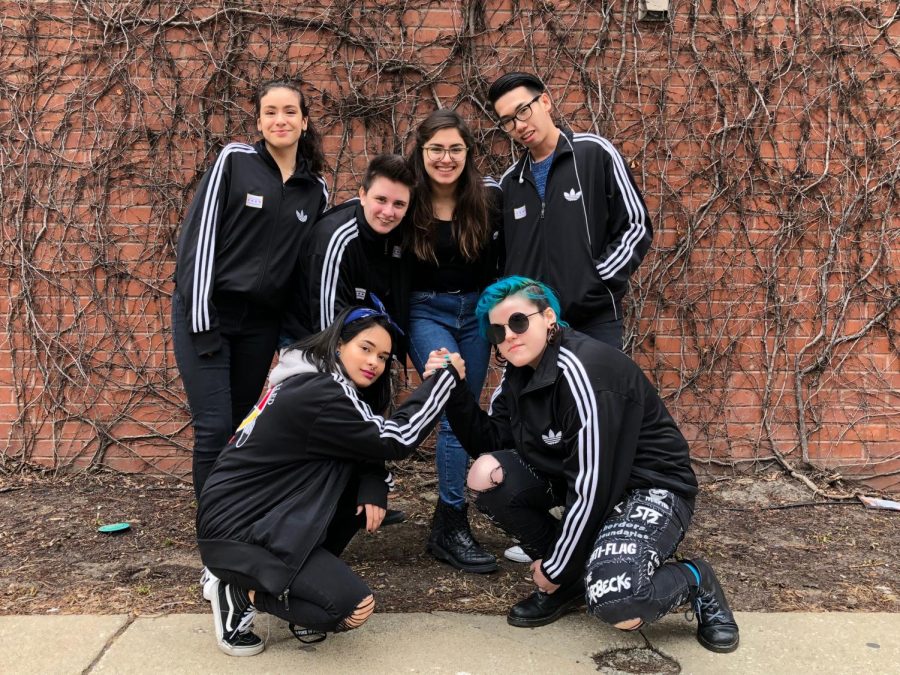A Tribe Called West to Compete at Poetry Slam Competition
Members of A Tribe Called West perform their own slam poetry at competitions throughout the year. Photo courtesy of Phong Lai.
Mar 2, 2018
A Tribe Called West, Niles West’s very own slam poetry team, will be participating at a competition in downtown Chicago this upcoming weekend. The group will be preforming four individual pieces, as well as one group piece.
The group competes in 4-5 competitions yearly, which range from 2-3 hours each. Though they compete in multiple events throughout the year, such as regional slam “Louder Than a Lawnmower” in December, the biggest competition is the “Louder Than a Bomb” festival- the world’s largest poetry slam for teenagers. This gives competitors the opportunity to celebrate spoken word with the “largest audience to happen on planet earth for young teen writers.”
Sponsor and coach Paul Bellwoar stresses the importance of how the group provides both a brave and a safe space for those looking to use writing as an outlet. The group holds themselves to a very high standard, which is recognized by their peers from other schools; according to Bellwoar, there have been multiple instances of other coaches bumping into him at competitions and complimenting poems the group performed up to five years ago.
“Sometimes writers come with things that have been mulling inside of them and they need to put it down on paper and go through the extensive revising and editing process to try to figure out what they really mean,” Bellwoar said. “We only have our own experiences to work with-our own difficulties of what its like to miss a concert to study for AP Calc, growing up in a culture where you can’t date boys, what is it like to be a state champ for chess- those are the things people over the years have started to expect from us and appreciate.”
The group tries to tell good stories that reflect the multicultural experience that comes out of Niles West. Members look to read, revise, prepare for competition, and become overall better writers by becoming familiar with situations of “writers block” and success. In many cases, as Bellwoar described, students may work on a poem for six months, but they may catch “lightening in a bottle” one day at practice and craft an amazing poem in 25 minutes. The abilities to be patient and respect different art forms are vital aspects to being successful in poetry slam.
“Many times, poetry will be about emotional issues, sometimes psychological, and sometimes it’s ‘how do I get through the day being a junior in four AP classes?’ It’s important to honor and respect someone’s story telling, and the fact that, if you’re writing a poem for performance, there is criticism involved in it. That doesn’t reflect that you’re not a good person; it’s about what the poem will actually look like, on the page, on the stage, and then rehearsed,” Bellwoar said. “Putting the story down on the page is a very intimate experience; it involves being open and receptive. The honor, respect, and bravery goes a lot of different ways and to have people in the room whom you trust is a big deal.”
Bellwoar recalls attending a poetry slam reading by two Muslim Niles West alumnae at the Skokie Library recently. One audience member in the crowd mentioned how “he never knew Muslims could write poetry,” prompting the women to discuss their experience with A Tribe Called West and the importance of having the feeling of safety to share their stories.
“The fact they are coming up through our organizations is groundbreaking in ways because they represent someone who’s never experienced having much of a voice– we have such wonderful and vast cultural experiences here, but just sharing the human experience through poetry is a really valuable thing,” Bellwoar said.
After viewing a documentary on the major Chicago poetry competition “Louder Than a Bomb” her freshman year, current senior and A Tribe Called West member Sarah Montes began to write her own poetry. She credits much of her inspiration to Bellwoar, describing him as not only her role model and poetic guide, but as someone who embraces what makes each and every individual different and troubled.
“Poetry is my home away from home. I’ve been given the liberty to say what I need to say, the way it needs to be said, giving me the opportunity to mold myself as much as I need to. It’s opened my eyes to diverse realities and viewpoints. I am who I am because I can listen and create- two things that are really important as an artist,” Montes said.
The group plans to preform a group piece titled “Patient Boy,” which is the story of Ryan Volpe, a transgendered student at Niles West with a strong talent. The piece stemmed from an individual piece for the competition, and the group has been working countless hours to write, choreograph, and memorize it.
“It’s really insane, the amount of work- but to us, that’s what matters. The point is not the point, the point is the poetry,” Montes said. “We stay because of the time we spend to together; competition is just a bonus.”
Senior and two-year memeber Phong Lai will be performing an individual piece, one that is essentially comprised of Lai “trash-talking other chess nerds” at the Illinois State Chess tournament. The poem is entitled, “Talking Smack At the State Chess Tournament.” He has memorized the poem and has been working on his movements to try and add variety to his performance.
“Poetry has served as an outlet for me to find my self-confidence and allowed me to creatively express myself through writing. It’s an environment where like-minded individuals can write and critique writing together without fear of being judged,” Lai said. “I have managed to find my own voice through the team and the people of Tribe are like family to me. They have been with me through every step of my growth as a writer and performer. Poetry is just one of those things where, if you find the right words, you can just immediately connect with anyone.”
A Tribe Calls West meets each Saturday from 9 a.m. to 12 p.m. and after school during competition season to prepare. They consider what they do in the classroom space far more important than the three minutes of what happens on stage, believing that what happens in competition is not as important as somebody coming to grips with the issue they have been wrestling with. As Bellwoar puts it, it’s about having “the ability to get the story right, the ability to have people help you get the story right, and the ability to be part of the team.”
“We use the analogy ‘X-Men’- we’re all kind of mutants in our own special way, and this is a place we can all discuss our ‘mutant powers’ and learn to develop them a little bit. What’s critical is people honor their own experience, whether it’s having a nervous breakdown on stage and respecting that, or performing the best you’ve ever preformed,” Bellwoar said. “This is a growth process, and you have to honor and respect yourself in terms of being an artist who is coming to terms with how to do their art.”




